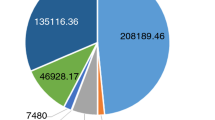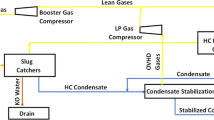Abstract
Low-grade waste heat recovery technologies reduce the environmental impact of fossil fuels and improve overall efficiency. This paper presents the economic assessment of greenhouse gas (GHG) reduction through waste heat recovery using organic Rankine cycle (ORC). The ORC engine is one of the mature low temperature heat engines. The low boiling temperature of organic working fluid enables ORC to recover low-temperature waste heat. The recovered waste heat is utilized to produce electricity and hot water. The GHG emissions for equivalent power and hot water from three fossil fuels—coal, natural gas, and diesel oil—are estimated using the fuel analysis approach and corresponding emission factors. The relative decrease in GHG emission is calculated using fossil fuels as the base case. The total cost of the ORC system is used to analyze the GHG reduction cost for each of the considered fossil fuels. A sensitivity analysis is also conducted to investigate the effect of the key parameter of the ORC system on the cost of GHG reduction. Throughout the 20-year life cycle of the ORC plant, the GHG reduction cost for R245fa is 0.02 $/kg to 0.04 $/kg and that for pentane is 0.04 $/kg to 0.05 $/kg. The working fluid, evaporation pressure, and pinch point temperature difference considerably affect the GHG emission.
Similar content being viewed by others
References
B. F. Tchanche, Gr. Lambrinos, A. Frangoudakis and G. Papadakis, Low-grade heat conversion into power using organic Rankine cycles — A review of various applications, Renewable and Sustainable Energy Reviews, 15 (8) (2011) 3963–3979.
V. H. Maria, CO2 Emissions from fuel combustion highlights, International Energy Agency (2012).
BCS, Incorporated, Waste heat recovery: Technology and opportunities in U.S. industry, U.S Department of Energy (2008).
M. A. Khatita, T. S. Ahmed, F. H. Ashour and I. M. Ismail, Power generation using waste heat recovery by organic Rankine cycle in oil and gas sector in Egypt: A case study, Energy, 64 (1) (2014) 462–472.
D. Wang, X. Ling and H. Peng, Performance analysis of double organic Rankine cycle for discontinuous low temperature waste heat recovery, Applied Thermal Engineering, 48 (15) (2012) 63–71.
F. A. Al-Sulaiman, I. Dincer and F. Hamdullahpur, Exergy analysis of an integrated solid oxide fuel cell and organic Rankine cycle for cooling, heating and power production, Journal of Power Sources, 195 (8) 15 (2010) 2346–2354.
K. Tom, Combined heat and power: evaluating the benefits of greater global investment, International Energy Agency (2008).
K. Tom, Combined heating and power and emissions trading: options for policy makers, International Energy Agency (2008).
O. Balli, H. Aras and A. Hepbasli, Thermodynamic and thermoeconomic analyses of a trigeneration (TRIGEN) system with a gas-diesel engine: Part II — An application, Energy Conversion and Management, 51 (11) (2010) 2260–2271.
X. Q. Kong, R. Z. Wang and X. H. Huang, Energy efficiency and economic feasibility of CCHP driven by stirling engine, Energy Conversion and Management, 45 (9–10) (2004) 1433–1442.
P. Ahmadi, I. Dincer and M. A. Rosen, Exergoenvironmental analysis of an integrated organic Rankine cycle for trigeneration, Energy Conversion and Management, 64 (2012) 447–453.
P. Ahmadi and I. Dincer, Exergoenvironmental analysis and optimization of a cogeneration plant system using Multimodal Genetic Algorithm (MGA), Energy, 35 (12) (2010) 5161–5172.
C. Liu, C. He, H. Gao, H. Xie, Y. Li, S. Wu and J. Xu, The environmental impact of organic Rankine cycle for waste heat recovery through life-cycle assessment, Energy, 56 (1) (2013) 144–154.
M. Li, J. Wang, S. Li, X. Wang, W. He and Y. Dai, Thermo-economic analysis and comparison of a CO2 transcritical power cycle and an organic Rankine cycle, Geothermics, 50 (2014) 101–111.
M. Imran, B. S. Park, H. J. Kim, D. H. Lee, M. Usman and M. Heo, Thermo-economic optimization of regenerative organic rankine cycle for waste heat recovery applications, Energy Conversion and Management, 87 (2014) 107–118.
B. Thonon, Design method for plate evaporators and condensers, 1st International Conference on Process Intensification for the Chemical Industry, BHR Group Conference Series Publication, 18 (1995) 37–47.
Y. Y. Hsieh and T. F. Lin, Saturated flow boiling heat transfer and pressure drop of refrigerant R-410A in a vertical plate heat exchanger, International Journal of Heat and Mass Transfer, 45 (5) (2002) 1033–1044.
D.-H. Han, K.-J. Lee and Y.-H. Kim, Experiments on the characteristics of evaporation of R410A in brazed plate heat exchangers with different geometric configurations, Applied Thermal Engineering, 23 (10) July (2003) 1209–1225.
D.-H. Han, K.-J. Lee and Y.-H. Kim, The characteristics of condensation in brazed plate heat exchangers with different chevron angles, Journal of the Korean Physical Society, 43 (1) (2003) 66–73.
Direct Emissions from Stationary Combustion Sources, United States Environmental Protection Agency (EPA), May (2008).
Author information
Authors and Affiliations
Corresponding author
Additional information
Recommended by Associate Editor Tong Seop Kim
Muhammad Imran is a Ph.D. student of Energy System Engineering at the University of Science and Technology, Daejeon, Korea. His research interests include thermodynamic analysis and optimization for sustainable energy systems. The investigation of heat transfer and pressure drop characteristics of the organic Rankine cycle working fluids in heat exchangers is one of the core research areas of his Ph.D. works.
Byung-Sik Park is a principal researcher at the Korea Institute of Energy Research, Korea. He received his doctorate degree from Chungnam National University, Daejeon, Korea. He has over 20 years of experience in research and development of national projects, focused on district heating, organic Rankine cycle systems, Stirling engines, and combined heat and power systems.
Hyouck-ju Kim is a principal researcher at the Korea Institute of Energy Research, Korea. He received his doctorate degree from Kuyngpook National University, Daegu, Korea. His research interests include district heating, Stirling engines, design and optimization of CHP systems, and combustion engineering.
Rights and permissions
About this article
Cite this article
Imran, M., Park, BS., Kim, HJ. et al. Economic assessment of greenhouse gas reduction through low-grade waste heat recovery using organic Rankine cycle (ORC). J Mech Sci Technol 29, 835–843 (2015). https://doi.org/10.1007/s12206-015-0147-5
Received:
Revised:
Accepted:
Published:
Issue Date:
DOI: https://doi.org/10.1007/s12206-015-0147-5




